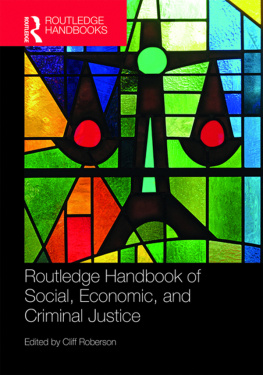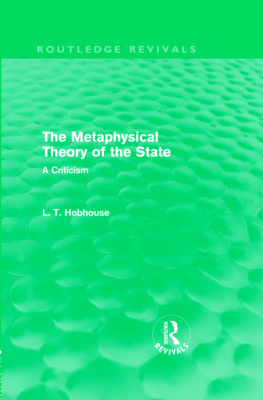L. T. Hobhouse - The Elements of Social Justice
Here you can read online L. T. Hobhouse - The Elements of Social Justice full text of the book (entire story) in english for free. Download pdf and epub, get meaning, cover and reviews about this ebook. year: 2009, publisher: Routledge, genre: Science. Description of the work, (preface) as well as reviews are available. Best literature library LitArk.com created for fans of good reading and offers a wide selection of genres:
Romance novel
Science fiction
Adventure
Detective
Science
History
Home and family
Prose
Art
Politics
Computer
Non-fiction
Religion
Business
Children
Humor
Choose a favorite category and find really read worthwhile books. Enjoy immersion in the world of imagination, feel the emotions of the characters or learn something new for yourself, make an fascinating discovery.

- Book:The Elements of Social Justice
- Author:
- Publisher:Routledge
- Genre:
- Year:2009
- Rating:3 / 5
- Favourites:Add to favourites
- Your mark:
- 60
- 1
- 2
- 3
- 4
- 5
The Elements of Social Justice: summary, description and annotation
We offer to read an annotation, description, summary or preface (depends on what the author of the book "The Elements of Social Justice" wrote himself). If you haven't found the necessary information about the book — write in the comments, we will try to find it.
First published in 1922, this title written by L. T. Hobhouse, British politician and one of the leading theorists of Social Liberalism, is a seminal work concerning the social application of ethical principles for the common good.
L. T. Hobhouse: author's other books
Who wrote The Elements of Social Justice? Find out the surname, the name of the author of the book and a list of all author's works by series.
The Elements of Social Justice — read online for free the complete book (whole text) full work
Below is the text of the book, divided by pages. System saving the place of the last page read, allows you to conveniently read the book "The Elements of Social Justice" online for free, without having to search again every time where you left off. Put a bookmark, and you can go to the page where you finished reading at any time.
Font size:
Interval:
Bookmark:

by George Allen & Unwin Ltd
2 Park Square, Milton Park, Abingdon, Oxon, OX14 4RN
by Routledge
270 Madison Avenue, New York, NY 10016
The publisher has gone to great lengths to ensure the quality of this reprint but points out that some imperfections in the original copies may be apparent.
The publisher has made every effort to trace copyright holders and welcomes correspondence from those they have been unable to contact.
ISBN 13:978-0-203-87129-4 (ebk)
ISBN 10:0-203-87129-4 (ebk)
- By the same Author
- THE METAPHYSICAL THEORY OF THE STATE
- THE RATIONAL GOOD
- SOCIAL DEVELOPMENT: ITS NATURE AND CONDITION
Ruskin House
GEORGE ALLEN & UNWIN LTD
MUSEUM STREET LONDON
October 1, 1921.
ETHICS AND SOCIAL PHILOSOPHY
- Social and political institutions are not ends in themselves. They are organs of social life, good or bad, according to the spirit which they embody. The social ideal is to be sought not in the faultless unchanging system of an institutional Utopia, but in the lore of a spiritual life with its unfailing spring of harmonious growth unconfined. But growth has its conditions and the spiritual life its principles, the sum of which in the relation with which we are here concerned we call Social Justice. To define these conditions and display them as a consistent whole is the object of this book. In what institutions they may best be realized is a further question, on which history and psychology, economics and politics must have their say. We approach this problem towards the close of the volume, but our main concern is not with applications but with principles, not with institutions but with the ends that they serve. This is not a popular subject in political controversy, for it is obnoxious to those who, making success their god, naturally wish to discard all questions of right and wrong, and is hardly more attractive to the reformer, who sees a short cut to Utopia in some political or economic change in pursuit of which he is ready to throw away everything that makes social life worth living. Both views are practically disastrous as they are theoretically false. Politics must be subordinate to Ethics, and we must endeavour to see Ethics not in fragments but as a whole. The need of a reasoned ethical basis for political reform was more clearly recognized a hundred years ago than it is to-day, and perhaps that is one of the reasons why for a couple of generations the course of political improvement made steady strides, while the lack of such principles may partly explain why the forces of progress have fallen into disorder and left the world to the reign of violence.
- Whatever hostages it may have given to criticism, the Benthamite school had the merit of clearly and avowedly subordinating politics to ethics, and attempting to apply a simple and comprehensive theory of the good as the touchstone of all personal and social relations alike. The Greatest Happiness principle is now and long has been out of favour, but one of its most determined critics, T.H.Green, recognized that it was as much for its virtues as for its vices that it was unpopular, and as I think that it contains valuable elements of truth that have been too much ignored, I propose to examine it here and sift if possible the grain from the chaff. Benthams principle, then, is that actions are good in so far as they tend to promote the greatest possible happiness of the greatest possible number of those whom they affect. All questions of right and wrong were to be referred to this standard. What, for example, are the rights of property? Show that upon the whole private property tends to make the generality of people happy and you justify it. Show that it tends to make them unhappy and you condemn it. Show that any particular development of these rights has one or other of these effects and you justify it or condemn it, as the case may be. Show that in a given particular case the exercise of a right will cause misery though in general it is necessary to happiness, and you have then to consider the probable consequence of making an exception. Now it may be, sometimes it clearly is, exceedingly difficult to make such calculations, but the principle has this element of value which the scientific sociologist may appreciate. It gives him an open field for investigation. He is tied by no rights or duties which are absolute and independent of all consequences. It is open to him to investigate freely all the conditions upon which human happiness and misery depend and from the best view that he can obtain draw his conclusions as to what is right and wrong in institutions. It does not by any means follow that he will put a low value on general rights and duties. On the contrary, a survey of society will probably convince him that one of the things generally necessary to human happiness is security, and that men can neither shape their own lives nor cooperate with one another unless they know what to expect and what is expected of them under given conditions, unless, that is, they have recognized rights and duties. At the same time he will see how important it is that rights and duties should be modifiable by a regular and agreed procedure in accordance with the changing requirements of human happiness. Thus the Utilitarian principle has at least the merit of providing a basis for an applied sociology.
Font size:
Interval:
Bookmark:
Similar books «The Elements of Social Justice»
Look at similar books to The Elements of Social Justice. We have selected literature similar in name and meaning in the hope of providing readers with more options to find new, interesting, not yet read works.
Discussion, reviews of the book The Elements of Social Justice and just readers' own opinions. Leave your comments, write what you think about the work, its meaning or the main characters. Specify what exactly you liked and what you didn't like, and why you think so.






